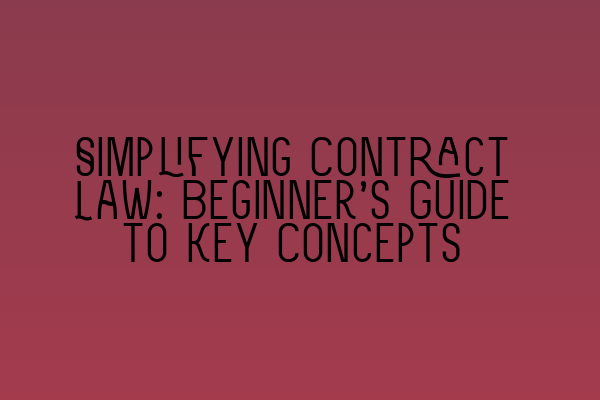Simplifying Contract Law: Beginner’s Guide to Key Concepts
Welcome to our comprehensive beginner’s guide to key concepts in contract law. Whether you’re a novice looking to understand the basics or a professional seeking a refresher, this guide aims to simplify the complexities of contract law and provide you with a solid foundation.
Understanding Contracts
Before we delve into the key concepts, it’s important to understand what a contract is. A contract is a legally binding agreement between two or more parties that establishes the rights and obligations of each party. Contracts can be verbal or written, but written contracts are generally preferred for clarity and evidence purposes.
Now, let’s explore the essential elements that make up a contract:
1. Offer and Acceptance
An offer is a clear and definite promise to perform or refrain from performing a specific action. Acceptance occurs when the offer is agreed upon without any modifications or conditions. It’s essential for both parties to have a mutual understanding of the terms and to demonstrate their intention to be legally bound by the agreement.
2. Consideration
Consideration refers to something of value exchanged between the parties involved in the contract. It can be in the form of money, goods, services, or promises. Without consideration, a contract may be deemed unenforceable. Both parties must give and receive consideration for the contract to be valid.
3. Intention to Create Legal Relations
In order for a contract to be legally enforceable, there must be an intention by the parties to create legal relations. Generally, commercial agreements are presumed to have an intention to create legal relations, while social agreements often do not. However, this presumption can be rebutted based on specific circumstances.
4. Capacity
Capacity refers to the legal ability of a person to enter into a contract. Generally, adults are presumed to have the capacity to contract, while minors, those with mental incapacity, and certain individuals under the influence of drugs or alcohol may lack the capacity. Contracts entered into by parties without the required capacity may be deemed voidable.
5. Consent
For a contract to be valid, both parties must give their free and genuine consent. Consent can be affected by factors such as fraud, misrepresentation, duress, undue influence, or mistake. If consent is obtained through any of these factors, the contract may be voidable at the option of the affected party.
6. Legality
A contract must have a legal purpose and cannot be for an illegal activity or against public policy. If a contract is found to be illegal or contrary to public policy, it will be deemed unenforceable by the courts.
7. Certainty
A contract must be clear and certain in its terms. All essential terms, such as the subject matter, price, and quantity, must be sufficiently defined for the contract to be enforceable. Uncertainty or ambiguity in a contract may render it void or unenforceable.
It’s important to note that these key concepts are just the tip of the iceberg in contract law. There are many nuances and additional considerations to be aware of, depending on the specific circumstances and nature of the contract.
If you’re interested in further exploring the legal profession and expanding your knowledge, we recommend checking out these related articles:
- Navigating Legal Challenges and Pitfalls in Your Practice
- Barrister vs. Solicitor: A Comprehensive Comparison
- Exploring Different Solicitor Specializations: Finding Your Niche
- Embracing the Rise of Virtual Law Practices
- Navigating the Maze: Demystifying Ethical Responsibilities of Solicitors
We hope this beginner’s guide has provided you with a clearer understanding of the key concepts in contract law. Remember, seeking legal advice from a qualified solicitor is always recommended when dealing with contract matters to ensure compliance with the law and protect your interests.
Disclaimer: This article is for informational purposes only and should not be construed as legal advice.
